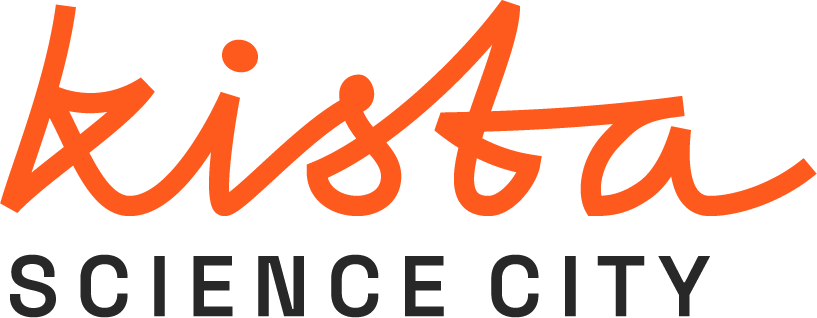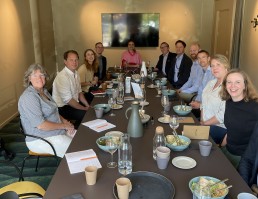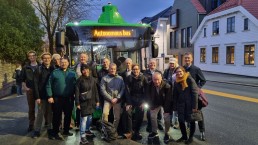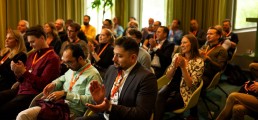New partners Flasheye and Bosch joins testbed for smart traffic systems
Flasheye and Bosch join Kista’s smart traffic systems testbed. These collaborations aim to enhance urban traffic management and safety by leveraging cutting-edge AI and 3D LiDAR technologies. Together with other testbed partners, these companies will help advance the development of intelligent solutions and progress toward smarter and safer cities.
The testbed
The smart traffic systems testbed offers a unique environment for evaluating and advancing innovative traffic management solutions. Here, companies of various sizes, from all across Sweden and beyond, can test and refine their technologies in a real-world urban environment. The site is fully equipped with essential power and high-speed communication infrastructure, ensuring smooth operations and fostering collaboration among various stakeholders, including the City of Stockholm. It also has a structured process and framework to ensure compliance with data privacy regulations when deploying and testing multi-sensor equipment within the designated urban area.
Flasheye
Flasheye is on a mission to make cities safer with their project, “3D Detection for Safer Cities and Roads.” Utilizing advanced 3D LiDAR technology, they gather real-time data from urban traffic environments. Their high-resolution sensors create a digital representation of the environment, focusing on shapes and movements while safeguarding privacy by only capturing silhouettes and shapes.
“By monitoring traffic flow, identifying objects like slow or stationary vehicles, speeding cars, pedestrians, and cyclists, we can collect valuable data on size, speed, and more,” says Ida Rehnström, Deputy CEO at Flasheye. “This data is crucial for developing solutions that prevent accidents and optimize traffic management in urban environments. By participating in the testbed, we hope to gain valuable experience and contribute to creating a certified solution for smart cities.”
Bosch
Bosch brings their state-of-the-art AI-camera technology to the testbed, offering real-time detection of vehicles and pedestrians. Their edge-based system processes data on-site, reducing reliance on cloud infrastructure and enhancing data privacy. With a focus on real-world conditions, Bosch aims to refine their algorithms for optimal performance. Their proactive engagement with regulatory bodies like The Swedish authority for privacy protection (IMY) ensures their solutions meet the highest privacy standards.
“The testbed provides a unique environment for collaboration,” says Anders Karlsson, PMM, CCTV at Bosch Security Systems. “By working alongside other leading companies, we can establish strategic partnerships, expand our industry network, and ultimately drive progress in integrating our technology seamlessly into existing urban infrastructure. We have already established several short-term collaborations within the testbed”
The future
Looking ahead, Flasheye’s and Bosch’s systems will help enhance urban management, setting new benchmarks for safety and efficiency. As these technologies evolve and integrate, they will contribute to a more responsive and adaptive city infrastructure, ultimately improving the quality of life for residents and supporting sustainable urban growth. Moreover, the collaboration between Flasheye, Bosch, and other partners in the testbed creates a strong ecosystem of knowledge and technologies.
Curious about our smart traffic systems testbed and how you can get involved? Reach out to explore partnership opportunities, discuss your goals, and learn how our testbed can help you achieve them. Contact Lucas Uhlen.
Drone adaptation in cities
The integration of drones into urban environments can transform the way we live and work, offering solutions for a wide range of applications. As this technology evolves, it is essential to address the challenges and opportunities that come with it to fully harness its potential.
To explore these important topics, we recently brought together top experts from academia, industry, and the public sector for a roundtable event. The discussion focused on EU’s ambitious drone strategy for 2030, evaluating Sweden’s readiness and outlining the steps needed to ultimately incorporate drones into everyday life.
Discussion takeaways
Drones offer significant potential for current and future business applications across various sectors. This underscores the importance of innovation, adaptability, technological advancements, and, not least, a robust regulatory framework for their integration into society. Additionally, there is a strong need for clear public communication to inform people about drones—their potential to promote sustainable urban development, as well as the challenges associated with their use.
The discussion wrapped up with a consensus on several key points, including:
- The necessity of a national drone strategy for Sweden.
- Initial implementations should focus on areas like outer city regions, healthcare, and emergency and rescue services to effectively demonstrate the benefits of drones to the public.
- Learning from successful models in other countries, notably the Netherlands.
Participants expressed a strong interest in continuing these discussions, focusing on how Sweden can remain a leader in innovation and address questions about funding drone infrastructure, public acceptance, and the future of urban drone integration.
For more information and to stay updated on future discussions, visit kista.com and join the conversation on the future of drone technology.
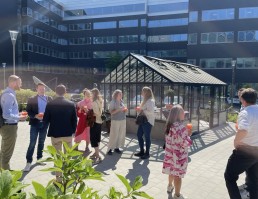

Digital twins and real-world impact
Digital twins & real-wold impact
In a world of rapid tech advancements, Kista’s tech ecosystem spearheads digital twin advancement, with numerous companies and research teams pushing technological boundaries and demonstrating real-world applications across urban development and environmental sustainability.
The mix of digital twin projects underscores the importance of collaboration in driving new tech advancements. Within this ecosystem, a multitude of local research initiatives, and market- and government-driven projects are interconnected through overlapping project and reference groups. Datasets are shared among these projects to enrich the digital twins with diverse perspectives, enhancing their utility and scope, and creating an innovative arena for idea exchange and discoveries. This collaborative environment not only accelerates technological progress but also strengthens Kista’s role in hosting and fostering transformative projects in this field.
The potential of digital twins
A digital twin is a dynamic replica of a physical entity or system, bridging the physical and virtual worlds through data and simulation. This enables businesses and researchers to understand complexities, predict future conditions, and make informed decisions in real time.
Digital twins are applied in areas like urban planning, infrastructure, healthcare and manufacturing, offering unique insights into system performance and environmental impact. Lucas Uhlén, project leader at Kista Science City, highlights the practical benefits of these technologies, saying: ”Just as a shared blueprint guides everyone from plumbers to electricians in a building project, digital twins achieve a similar unity. They bring cross-disciplinary teams onto the same page, ensuring projects evolve smoothly from concept to integration. This approach fosters a common understanding of a challenge and its dependencies, which is vital for aligning diverse expertise and streamlining the development and maintenance of complex solutions.”
Spotlight on digital twin projects
Kista is home to several initiatives that showcase the practical applications and benefits of digital twins. From enhancing urban planning to optimizing environmental sustainability, these projects represent the cutting edge of digital twin solutions:
Digital Vision Kista, a collaborative partnership including the City of Stockholm, KTH, Ericsson, RISE, and Kista Science City, is pioneering the development of a visual 3D model for the Kista area. By integrating data from building plans, environmental sensors, and traffic patterns, this digital twin visualizes traffic flows and infrastructural changes. It offers valuable insights for traffic management and building energy needs throughout various stages of construction and use. The project aims to transform IoT sensor data into actionable insights for municipalities, demonstrating a model for leveraging digital twins in sustainable urban development and aligning with Agenda 2030 objectives.
Project Gemini is a collaboration between MIT and KTH through the Senseable Stockholm Lab, focusing on the impact of traffic flows on emission levels. Through the integration of emission sensors and traffic data, the project seeks to understand and mitigate environmental impacts in urban settings. This initiative illustrates how local synergies and shared data platforms can significantly contribute to developing sustainable urban environments.
Digital Vision Sverige, led by RISE, is an initiative to advance digital twin development across Sweden’s urban planning sector. By integrating data from multiple sources, digital twins offer a comprehensive view of urban landscapes, facilitating better planning, decision-making, and collaboration. This initiative aims to foster a resilient society prepared to face climate change, green transitions, and future crises through informed, data-driven strategies.
Synergies and collaboration
As the exploration and expansion of digital twins continue, Kista emerges as a focal point for this technological progress. Recognized by municipalities, academia, and industry alike as a natural hub for innovation, Kista facilitates a collaborative environment for knowledge exchange and the development of testbeds. In doing so, it plays an important role in realizing the potential of digital twins for the benefit of society and people.
Do you want to know more about Kista’s platform for testing and development of digital twins? Reach out to Lucas Uhlén at Kista Science City.
Safety in the digital age
Safety in the digital age
Perceived safety is a growing concern in cities across Sweden. As urban populations grow and environments become more complex, these challenges underscore the importance of creating secure, inclusive spaces for all residents. New technologies and models for collaboration offer key solutions to understanding and addressing these issues. This evolving landscape presents a prime opportunity for small tech companies to play a role in developing smart city solutions.
In 2023, the Safety Lab (Trygghetslabbet) served as a platform for municipalities, companies, and researchers to collaborate and explore innovative methods.
Several activities and initiatives took place within the Safety Lab framework and this article highlights two.
IMY pilot measuring public safety
This collaborative pilot investigated grey areas in data protection regulations, aiming to improve public sector efficiency and service while protecting citizen rights and privacy. The project, involving Kista Science City, IMY, IoT Sverige, and the City of Stockholm (Trafikkontoret), utilized LiDAR sensors to assess the effectiveness of safety measures by measuring movement in public spaces.
The “regulatory sandbox” format guides in interpreting and applying data protection regulations and opens doors for small tech companies to navigate complex regulations. This investigative and dialogue-based approach offered valuable learning and sharing opportunities for participating tech companies and stakeholders. The final report facilitates further understanding and serves as a reference for future projects navigating complex technology and legal grey areas.
Forum for urban safety with IoT
A series of workshops, aimed to accelerate learning and problem-solving through collaboration, focusing on leveraging Internet of Things (IoT) technologies to address urban safety concerns with a specific interest in ethics and integrity. These sessions brought together diverse stakeholders to brainstorm, share insights, and pilot innovative solutions directly impacting urban safety and community well-being. Nationellt forum för trygget i stadsrummet
Lucas Uhlén, project leader at Kista Science City, explains: “Our workshops were designed to initiate a testing environment where the focus was on how IoT can enhance the feeling of safety. By bringing together various actors, we sought to enhance our understanding of how innovative solutions can contribute to a safer, more appealing society.”
Uhlén further emphasizes the importance of early legal inclusion: “Engaging with legal experts from the start ensured our initiatives were grounded in respect for privacy, setting the course for this initiative but also setting an example for future projects.”
A model for the future
The Forum’s inclusive and forward-thinking approach complements traditional project methods. Integrating various stakeholders and legal considerations from the outset offers a valuable strategy for responsible and inclusive innovation across different sectors.
The Forum has laid the groundwork for future innovations, demonstrating the importance of collaboration, foresight, and a commitment to ethical principles in the pursuit of public safety.
Opportunities for businesses
The needs-based pilots in the Safety Lab have opened doors for small tech companies to break new ground. By understanding the public sector’s needs, participating in pilots, and actively engaging with stakeholders, companies can unlock valuable opportunities.
- Gain early insight: Gain crucial knowledge about the market framework and stay ahead of the curve by understanding evolving needs.
- Influence the market: Actively participate in pilots to shape future regulations and standards, ensuring your voice is heard in shaping the industry’s direction.
- Drive market growth: Contribute to the overall growth of the IoT and public safety market through your innovative solutions, fostering a safer and more secure future for communities.
Read the report Trygghet-i-stadsrummet to learn more about the projects and how innovative solution are shaping safer urban environment.
Applied Autonomy establishes Swedish hub
Applied Autonomy establishes Swedish hub
Applied Autonomy, known for innovative work in autonomous transportation, has chosen Kista as a strategic hub for their Swedish operations. This decision marks an important step in the Norwegian company’s expansion and commitment to grow within the Swedish market.
Swedish base
Choosing Kista as a Swedish hub reflects Applied Autonomy’s commitment to being closer to key partners and to becoming part of the dynamic tech landscape in the area. CEO Olov Medland shares his perspective on this strategic decision:
– Kista’s unique combination of technological expertise and collaborative culture made it an ideal choice for us. We are excited about being part of this tech community, contributing to and benefiting from the synergies it offers.
Applied Autonomy is positioned to play a significant role in the evolving landscape of urban transport in Stockholm and Sweden. The company is enthusiastic about sharing its insights and experiences in autonomous transport and collaborating with other companies and innovators in this field. “The possibilities are endless, and we’re eager to explore them,” says Medland.
5G Ride
Applied Autonomy has recently joined the 5G Ride project. Central to their contribution is the xFlow® platform, an innovative solution that ensures a seamless link between vehicles, operators, and end-users, thereby enabling safe and efficient transport. Medland emphasizes the importance of this project:
– Joining 5G Ride was a natural decision for us. The project aligns perfectly with our capabilities, including xFlow®, and our commitment to shaping the future of autonomous transportation. Our participation in this innovative project is an excellent opportunity to demonstrate how our technology can be integrated into existing urban transport systems, enhancing safety, efficiency, and overall user experience.
Cross-border dialogue on autonomous public transport
In November 2023, the 5G Ride project partners from Ericsson, RISE, & Kista Science City, in collaboration with Drive Sweden Policy Lab, Trafikverket, and Transportstyrelsen visited Stavanger, Norway, to observe a full-scale autonomous bus in a real urban setting. This visit allowed the teams to witness the operation of a self-driving, full-scale bus navigating complex urban conditions, including traffic lights, roundabouts, lane changes, and a tunnel, at speeds of up to 40 km/h.
Observations from Stavanger
The primary objective of the Norway trip was to discuss and understand the challenges and opportunities of advanced pilot projects in autonomous public transport. The discussions highlighted the importance of close collaboration between different stakeholders – including tech developers, public transport authorities, and regulatory entities – to drive progress in this complex field. This approach is crucial for combining expertise, sharing insights, and aligning efforts towards common goals in autonomous transportation. Additionally, local Norwegian partners emphasized the value of continual development, focusing on real-world testing of these systems to enhance safety and efficiency in urban mobility.
A key topic during the Stavanger visit was the comparison of the regulatory environments for autonomous vehicle testing in Sweden and Norway. Each country’s approach to regulations and funding for research projects has significant affect for the development of autonomous transport solutions. This highlighted the importance of adaptable regulatory frameworks in supporting advancement and innovation within this field.
Applied Autonomy
The visit to Norway was hosted by Applied Autonomy, a new partner in the 5G Ride project. As a company specializing in software solutions for autonomous transportation, Applied Autonomy brings crucial expertise to the project. Their involvement is expected to enhance the project’s capabilities, particularly in terms of scalable and adaptable autonomous solutions. This partnership marks a big step in the collaborative effort to develop and implement advanced autonomous transport systems.
In addition to Applied Autonomy, the Norway visit saw participation from several organizations, including Adastec, Vy, and Kolumbus, along with representation from Statens vegvesen. Each of these organizations contributed to the success of this trip, bringing unique perspectives and expertise to the discussions and demonstrations.
Future Directions
Looking ahead, the 5G Ride project plans for new demo days and test with autonomous vehicles in Stockholm in 2024. As the project enters its next phase, the project remains committed to leveraging international learnings and local expertise to revolutionize urban mobility. The combined efforts are key in our journey towards a more connected and sustainable future in public transportation.
Nationellt forum för trygghet i stadsrummet - fokus på integritet och etik
En ny nationell mötesplats ska fokusera på hur vi kan utveckla kloka IoT-lösningar som kan att öka tryggheten i det offentliga rummet, samtidigt som individens integritet skyddas.
Trygghet på gator och torg är ett komplext problem som kräver innovativa arbetssätt. Nya teknologier, som IoT-sensorer och artificiell intelligens (AI), har stor potential att bidra till att minska otryggheten. Sensorer kan användas för att observera ljusförhållanden och trafikflöden, vilket kan bidra till en mer inbjudande miljö. Sensorer är också intressant för att förstå hur invånare använder allmänna platser. AI kan användas för att analysera data från sensorerna och identifiera både potentiella risksituationer som situationer som upplevs trivsamma. En sådan analys bidrar till ökad kunskap om nuläge samt kan effektivisera de insatser som görs för att öka attraktivitet och upplevd trygghet.
Det är dock viktigt att nya teknologier används på ett ansvarsfullt sätt och då krävs en mycket god förståelse för integritet och etik.
Tidigare i år startades Trygghetslabbet i Kista, ett innovationslabb som samlar företag, fastighetsägare, kommuner och akademi för att utveckla nya arbetssätt för ökad trygghet i staden. Trygghetslabbet bidrar också till att utveckla marknaden för ny teknik och skapa nya affärer. Här pågår under hösten en pilot som undersöker integritetsfrågor i samband med mätning av vistelsemönster på gator och torg. Piloten genomförs tillsammans med Stockholms stad, IoT Sverige och Integritetsskyddsmyndigheterns (IMY) regulatoriska testverksamhet.
Nu kompletteras Trygghetslabbet med ett nytt strategiskt projekt på uppdrag av IoT Sverige. Svenska städer som arbetar aktivt med trygghet i staden och Internet of Things-tekniker samlas till en nationell mötesplats, ett forum, för erfarenhetsutbyte och lärande. Forumet kommer att fokusera på integritet, som är adresserat i dataskyddsförordningen (GDPR), och etik.
Forumet är ett samarbete mellan Kista Science City, IoT Sverige och flera svenska städer som arbetar aktivt med att hitta lösningar för ökad trygghet i staden.
Unikt för forumet är att det samlar många olika roller, från kommuner, städer och även leverantörer och experter. Detta möjliggör många perspektiv i diskussioner om komplexa frågor, något som varit efterfrågat.
Vanessa Ware, projektledare på Kista Science City, säger att samarbete och kunskapsdelning är avgörande för att utvecklahållbara lösningar på problemet med trygghet i offentliga miljöer. ”Genom att samlas och dela kunskap kan vi superboosta utvecklingen av ett komplext område som trygghet på allmänna platser. Det här forumet är nischat och till för dem som ligger i framkant. Området har stor potential och när vi hjälps åt kan vi komma framåt snabbare och lyckas skapakloka lösningar för den hållbara staden,” säger Vanessa.
Under hösten 2023 kommer forumet att erbjuda en serie workshops för att stärka deltagarnas kunskap och kompetens inom området.
Målsättningen är att stärka deltagarna i forumet i området juridik och etik inom trygghet i offentlig miljö och IoT samt att identifiera möjligheter och utmaningar att arbeta vidare med.
Bo Baudin, IoT Sverige, menar att det är viktigt att beakta integritets- och etiska aspekter i tidigt i utvecklingen av nya datadrivna tillämpningar
“Det arbete vi nu gör inom området trygghet i stadsrummet kommer bidra generellt till hur vi bäst arbetar med integritet och etik i utvecklingen av Internet of Things” , säger Bo Baudin, IoT Sverige.
Företag som är intresserade av att delta eller veta mer kan kontakta Vanessa Ware!
Läs mer om arbetet som sker inom trygghet med hjälp av ny teknik.
Navigating the skies: Drones and urban mobility
Navigating the skies: Drones and urban mobility
How can drones help cities become safer, more efficient, and sustainable? During Mobility Day 2023, experts in urban mobility and drone technology gathered for a panel discussion on this topic, addressing the transformative potential and challenges of integrating drones into urban transportation systems.
In the evolving urban environments of today, drones are rapidly becoming integral to modern urban transport strategies. The panel – featuring representatives from RISE, The City of Stockholm, Ericsson Drone Mobility, Region Stockholm, ATS Bromma and LFV – emphasized that drones have the potential to redefine a broad range of services. From efficient package deliveries to life-saving medical supplies like automated defibrillators, drones offer a flexible and eco-friendly alternative to traditional transport methods. With the right infrastructure, it’s anticipated that drone transport could replace up to 75% of express deliveries in the future.
However, innovation doesn’t come without its challenges. Regulatory constraints present a significant bottleneck, especially around permits and urban airspace ownership. Navigating these legal frameworks involves coordination between different layers of governance – from local municipalities to EU level. The panel also underscored behavioral challenges, noting that public perceptions, concerns and acceptance of drones in urban spaces play a vital role in their successful integration. There’s need for ongoing conversations, not just among cities, innovators, and policymakers, but also with the public to streamline regulations and create a supportive setting for drone integration into urban mobility.
On the technical side, allowing drones to operate beyond the pilot’s visual range brings up some specific challenges. These include not just limited control range but also concerns in other areas like data security and public safety, especially in high-density urban areas. During the panel discussion, it was noted that advancements in 5G connectivity are essential for improving the reliability and safety of drone operations in these settings. This technological progress, in turn, requires close cooperation between drone companies and mobile network providers to fine-tune network performance specifically for drones.
In conclusion, tackling these challenges calls for a collaborative, multi-disciplinary approach. The path forward lies in aligning not just on regulations but also on infrastructure, financing, and, not least, public acceptance. By establishing a shared vision and mutual understanding among all stakeholders, the acceleration of drone deployment in cities becomes not a question of “if” but “when”. As cities like Stockholm aim for ambitious sustainability goals, drone integration stands as a powerful means to achieve them.
Thanks to our panelists for contributing to this discussion:
Rasmus Lundqvist of RISE
Erik Levander of The City of Stockholm Transport Department
Anders Carlsson of ATS Bromma, LFV
Fredrik Flyrin of Ericsson Drone Mobility
Fredrik Engströmer of Region Stockholm
Karolina Pamp of Kista Science City
Learn more about ongoing activities in the area of Drones and Urban air mobility.
Reach out to Karolina if you want to talk more!
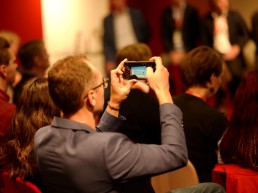
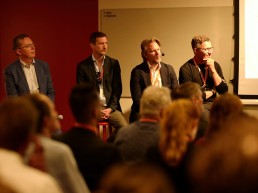
The power of data sharing
Towards sustainable mobility: The power of data sharing
How can data make our transportation systems more efficient, eco-friendly, and tailored to people’s needs? A session during Mobility Day 2023 took on this big question, with experts in the field discussing how data isn’t just about numbers – it’s a key tool for making urban mobility smarter and more sustainable.
The panel – featuring representatives from Voi Technologies, The Swedish Transport Administration, The City of Stockholm and Univrses – highlighted the critical role of data in shaping a sustainable future for urban mobility.
The key takeaway was clear: relevant and actionable data is a critical element in creating transportation systems that are both resource-efficient and aligned with the needs of the community. For instance, the use of connected vehicles was described as a game-changing approach to collecting detailed data on traffic flow and user behavior, which can then inform everything from day-to-day road maintenance to long-term urban planning initiatives.
Shifting from the mere collection of data, the discussion also touched on its real-world applications. For transformative change, data needs to be part of multi-disciplinary strategies involving software developers, urban planners, and policymakers alike. This is where standardization becomes crucial. Consistent data-sharing protocols, developed and maintained at both national and international levels, were mentioned as a driving-force for the next big leaps in transportation efficiency and sustainability.
The panel also emphasized that the value of data goes beyond guiding vehicles or informing decision-makers; it’s also key in shaping public behavior and influencing policy. Understanding travel patterns and time metrics, for example, can help refine the system and ultimately encourage more sustainable mobility choices. Ethical considerations, particularly regarding data privacy and compliance with GDPR guidelines, were underscored as essential for responsibly moving towards a data-driven future.
Looking ahead, it’s clear that data and data-sharing will be central in advancing more sustainable and efficient mobility solutions, not least in urban areas. Working together – across industries and borders – is key. As Stockholm and Sweden work towards meeting ambitious sustainability goals, the effective use of data stands out as a common thread tying many efforts together.
Thanks to our panelists for contributing to this interesting discussion!
Gustaf Soldan Patrikson of Voi Technologies
Anders Asp of The Swedish Transport Administration
Robin Billsjö of The City of Stockholm
Jonathan Selbie of Univrses
Lucas Uhlén of Kista Science City
Curious about the topic and want to talk more? Reach out to Lucas!
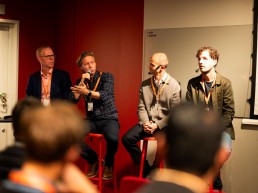
Mobility Day 2023
It’s that time again: Join us for Mobility Day 2023!
Mark your calendars and make sure to sign up for Mobility Day 2023.
Once again, in collaboration with Ericsson, Stockholms stad and Region Stockholm, we’re diving into the crucial interplay between mobility and sustainability, forging a path to a more eco-conscious future.
Mobility and sustainability are now more intertwined than ever before. Although travel and transport contribute significantly to Sweden’s emissions, we hold the power to to make a change. Driven by innovation, emerging business models, and important changes in behavior, we’re not just envisioning a greener future—we’re actively shaping it.
This year’s Mobility Day is designed to drive this change. We’ll be zeroing in on how innovative solutions and fresh business models can support the transition of our transport system, aligning with Sweden’s ambitious climate goals.
Throughout the day, expect a diverse array of stimulating talks, insightful seminars, and compelling pitches. These activities will be complemented by an open-air exhibition featuring demos and informative stands. This unique showcase serves as a dynamic platform for inspiring discussions, offering excellent networking opportunities.
Mobility Day brings together decision-makers from various sectors, including tech, automotive, academia and the public sector, all with a shared focus: innovation for a sustainable and efficient transport system.
Join us in Kista on 30 August, for a day full of knowledge, inspiration and collaborative spirit , as we collectively accelerate the journey toward sustainable mobility solutions.
Highlights of the day:
- Experience innovative concepts and emerging business models propelling us towards Sweden’s ambitious climate goals.
- Engage with experts spanning tech, automotive, academia, and the public sector, all driven by the pursuit of innovative, sustainable transport solutions.
- Delve into a captivating series of discussions, seminars, and pitches covering electrification, connectivity, data sharing, climate-smart drones, and trends in the automotive arena.
- Demo & Exhibition: Step into an open-air showcase featuring electrified vehicles, drones, and more. Connect with industry pioneers, fellow mobility enthusiasts, and future talents.
Event Details:
Date: 30 August, 2023
Location: Kista
Time: 08:30 AM – 05:00 PM
Secure Your Spot:
For more information and registration, visit our event site. See you there!
Mobility day is arranged by Kista Science City together with Ericsson, Stockholms stad and Region Stockholm.
Mobility Day is, through Fordonsdalen React, co-financed by the European Regional Development Fund and by the Region Stockholm Project Fund for sustainable regional development.
